GALICIA
LOVE AT FIRST
SIGHT
COSTA ÁRTABRA – A CORUÑA
WE INVITE YOU TO DISCOVER GALICIA
Galicia is a Spanish autonomous community located in the northwest of the Iberian Peninsula, considered as a historical nationality according to its statute of autonomy. Is made up of four provinces; A Coruña, Lugo, Ourense and Pontevedra.
The capital of Galicia is Santiago de Compostela, a city that captivates everyone who visits it, while Vigo is the most populous municipality and a mandatory stop if you visit the Galician geography.
A magical region that has it all: promenades, medieval quarters, cathedrals and heroic vineyards.
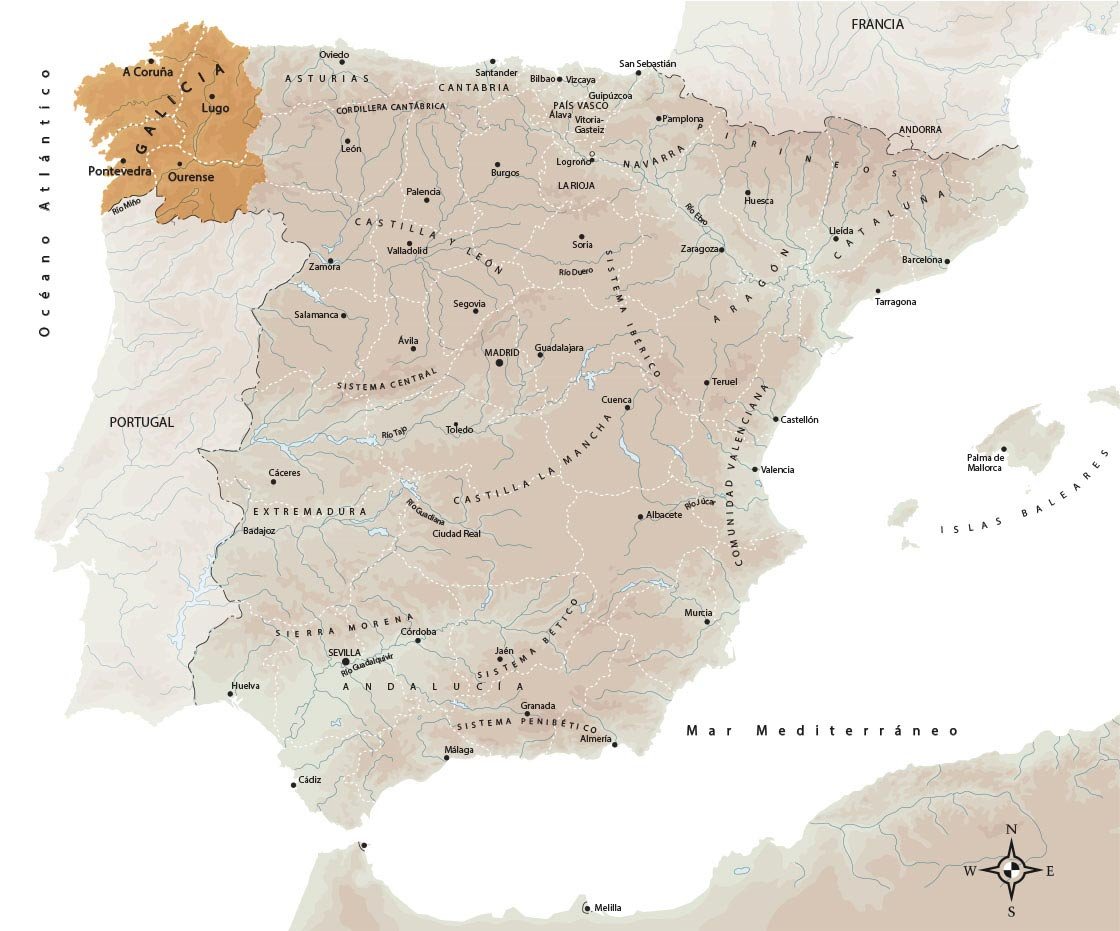
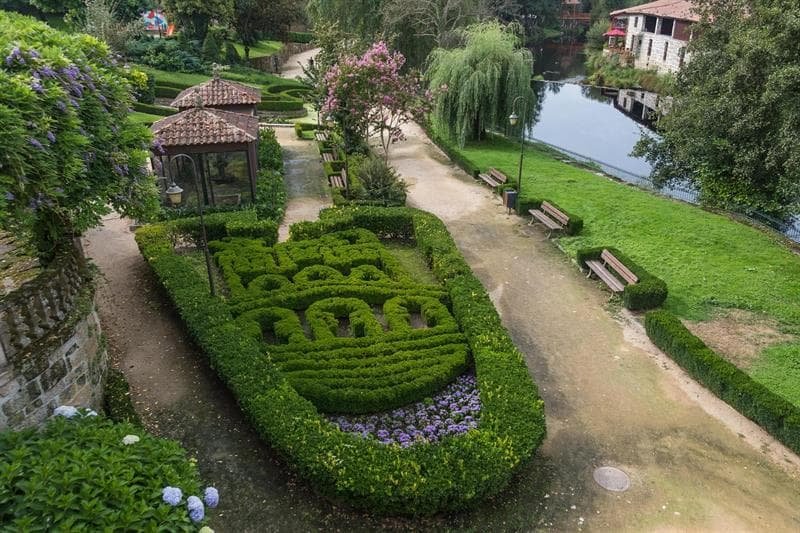
Gardens of Allariz, Ourense
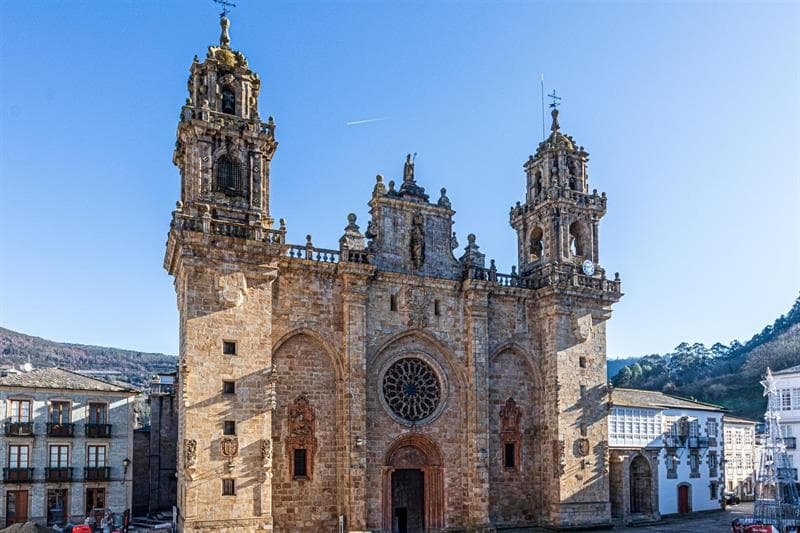
Cathedral of Mondoñedo, Lugo
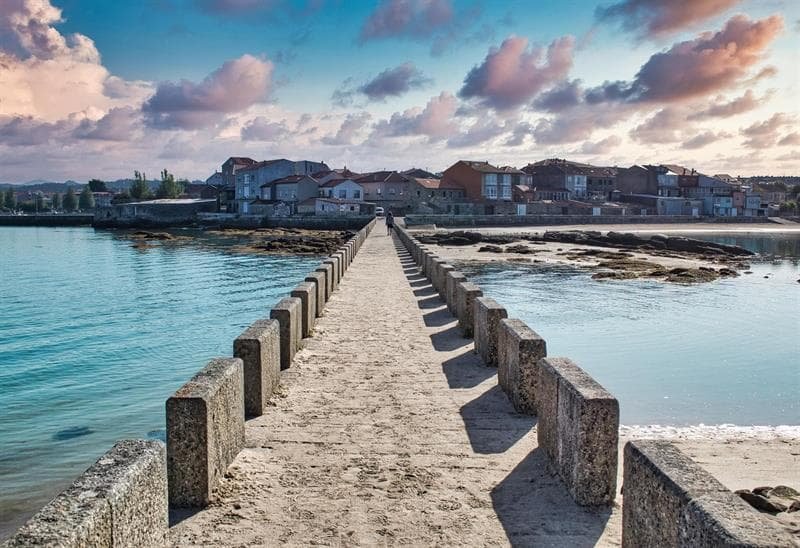
Cambados, Pontevedra
OURENSE, LUGO AND HISTORIC PONTEVEDRA
If you want to discover Galicia in its maximum splendor, you can visit both seaside and mountain towns that they will make you fall in love with every step. We name some of the most recommended to visit.
Allariz - Ourense
In the province of Ourense hides one of the most beautiful and picturesque towns in the north of Spain; Allariz. Touring the old town is like traveling back in time and transporting yourself to the time of the Middle Ages, as its traditional architecture remains in perfect condition.
The Santa Clara Convent is one of the most important monuments in the area. It’s a cloistered convent, but you can visit the Museum of Sacred Art.
Mondoñedo - Lugo
Mondoñedo was one of the most important cities in Galicia until the second half of the XIX century and, unlike other nearby towns, it has remained safe from mass tourism.
The most representative monument in this area is the Cathedral, since it differs by bringing together several architectural styles and it has a Harry Potter room inside. Also, the Museum House of Álvaro Cunqueiro is an essential stop if you visit Mondoñedo.
Cambados - Pontevedra
This fishing village located in the Ría de Arousa is one of the most important and well-known towns of the Rías Baixas of Pontevedra. Surprise all those who dare to walk its streets for its great historical heritage, declared a Site of Cultural Interest in 2001.
One of the biggest attractions in Cambados is the Albariño festival, declared as Festival of National Tourist Interest, where you can taste the most famous wines from its cellars. Is celebration takes place every year during the first week of August.
Cambados is one of the best preserved historical areas in Galicia thanks to its countless stately mansions, noble streets, sculptures and monuments.

Gardens of Allariz, Ourense
Allariz - Ourense
In the province of Ourense hides one of the most beautiful and picturesque towns in the north of Spain; Allariz. Touring the old town is like traveling back in time and transporting yourself to the time of the Middle Ages, as its traditional architecture remains in perfect condition.
The Santa Clara Convent is one of the most important monuments in the area. It’s a cloistered convent, but you can visit the Museum of Sacred Art.

Cathedral of Mondoñedo, Lugo
Mondoñedo - Lugo
Mondoñedo was one of the most important cities in Galicia until the second half of the XIX century and, unlike other nearby towns, it has remained safe from mass tourism.
The most representative monument in this area is the Cathedral, since it differs by bringing together several architectural styles and it has a Harry Potter room inside. Also, the Museum House of Álvaro Cunqueiro is an essential stop if you visit Mondoñedo.

Cambados, Pontevedra
Cambados - Pontevedra
This fishing village located in the Ría de Arousa is one of the most important and well-known towns of the Rías Baixas of Pontevedra. Surprise all those who dare to walk its streets for its great historical heritage, declared a Site of Cultural Interest in 2001.
One of the biggest attractions in Cambados is the Albariño festival, declared as Festival of National Tourist Interest, where you can taste the most famous wines from its cellars. Is celebration takes place every year during the first week of August.
Cambados is one of the best preserved historical areas in Galicia thanks to its countless stately mansions, noble streets, sculptures and monuments.
RIBEIRA SACRA, THE D.O. GALICIAN
There are endless Galician denominations and, among them, it is likely that the best known and with more tradition are Ribeiro and Rías Baixas, but Galician wine is not only reduced to these two origins. Specifically in Galicia, wine products can benefit from one of the five wine apellations of the community.
Rías Baixas Ribeiro Ribeira SacraValdeorras Monterrei
As if this were not enough, Galicia has four Protected Geographical Indications (Viños da Terra) that are responsible for regulating the quality of the grape and, therefore, of Galician wine. On the side of Viños da Terra, we find those from Betanzos, Barbanza-Iria, Ribeiras do Morrazo and Val do Miño-Ourense.
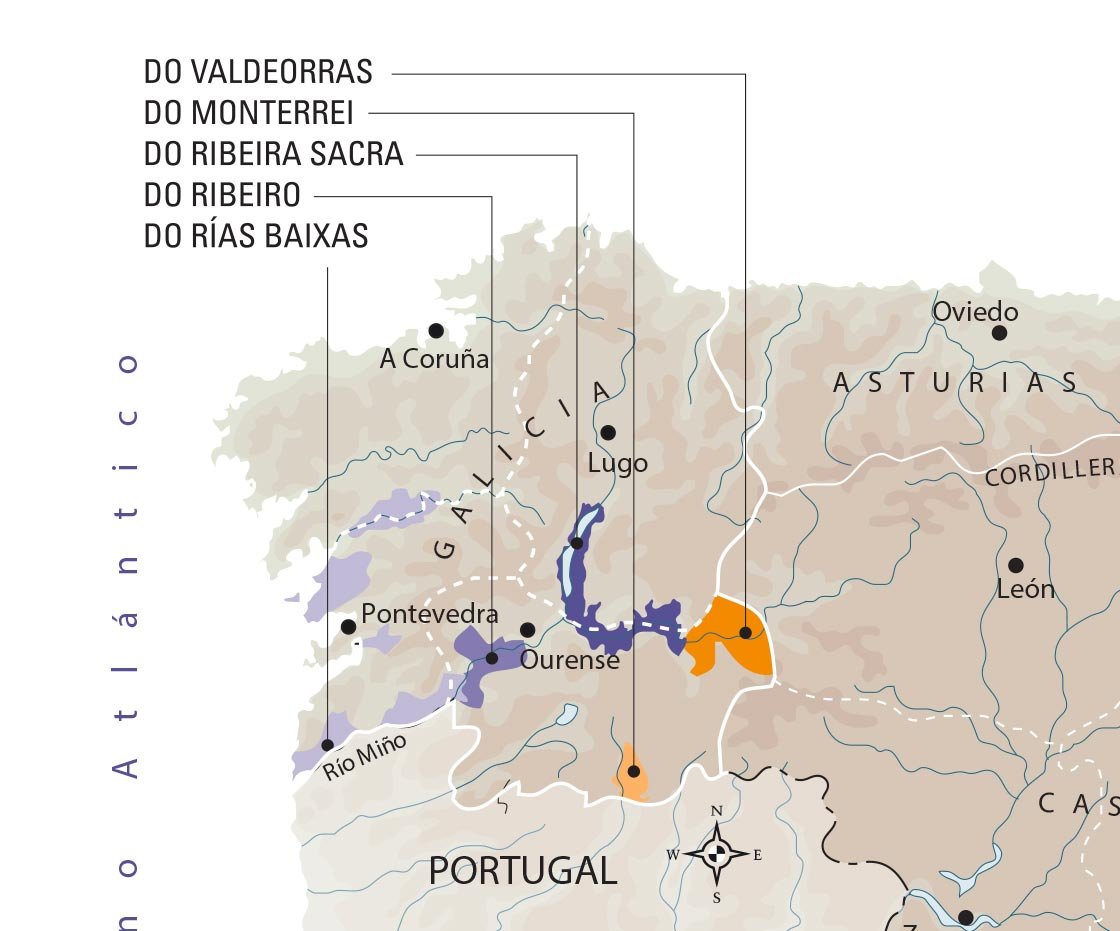
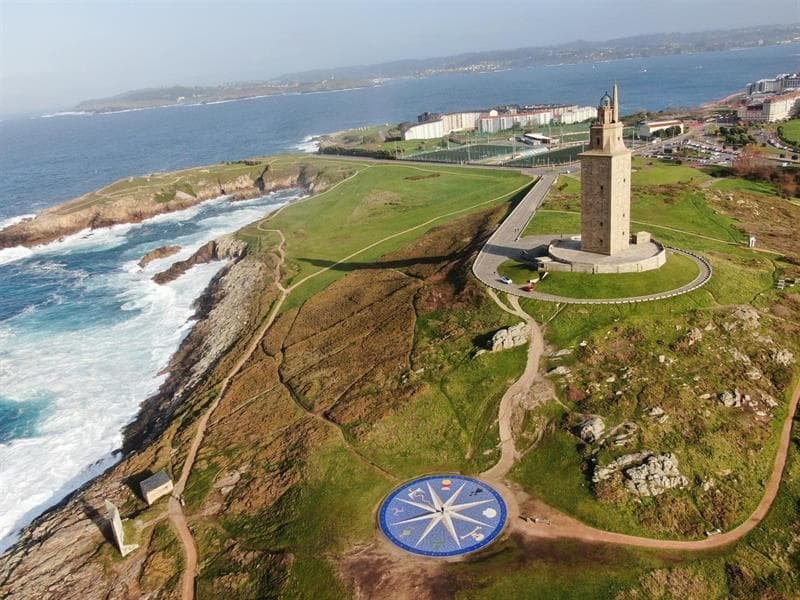
Tower of Hércules, A Coruña
TOWER OF HÉRCULES, A CORUÑA
The Tower of Hercules is one of the most representative monuments of the city of A Coruña, so is a mandatory stop if you visit the Atlantic balcony. It is a tower and lighthouse, located on a hill on the coast of A Coruña. It is 55 meters high and is the only Roman lighthouse that is still in operation, as well as the oldest in the world.
A total of 234 steps separate the base of the tower from some worthwhile movie views to enjoy.

Torre de Hércules, A Coruña
TOWER OF HÉRCULES, A CORUÑA
The Tower of Hercules is one of the most representative monuments of the city of A Coruña, so is a mandatory stop if you visit the Atlantic balcony. It is a tower and lighthouse, located on a hill on the coast of A Coruña. It is 55 meters high and is the only Roman lighthouse that is still in operation, as well as the oldest in the world.
A total of 234 steps separate the base of the tower from some worthwhile movie views to enjoy.
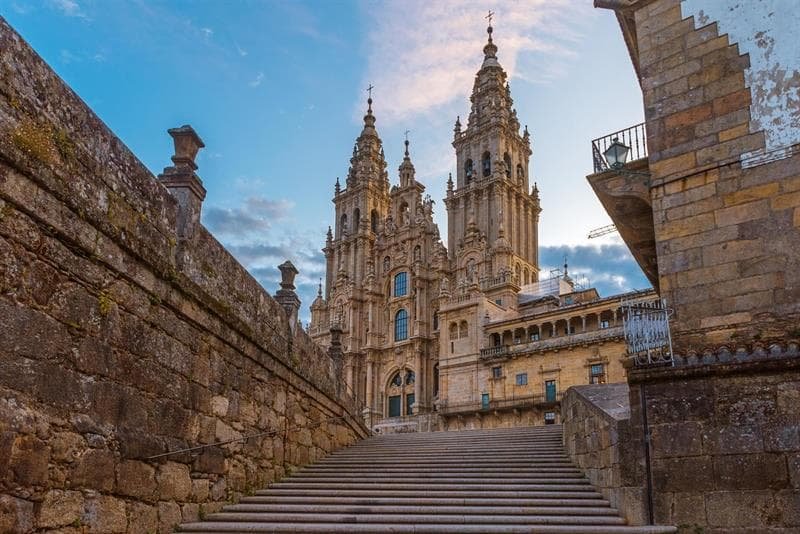
The Cathedral of Santiago of Compostela
SANTIAGO’S ROAD
Santiago de Compostela is the capital and heart of Galicia, being an ancient city declared as a World Heritage Site by UNESCO in 1985. It is known for the completion of the Galician pilgrimage route, better known as the Camino de Santiago.
It stands out for being one of the three great pilgrimage centers of the Christian religion, together with Rome and Jerusalem, since it is known that the apostle Santiago “the oldest”, was buried in this magnificent city.
The apostle’s remains are found in the Cathedral, which has some elaborate carved stone facades that open onto the large squares with medieval walls of the city, consecrated in 1211.

The Cathedral of Santiago of Compostela
SANTIAGO’S ROAD
Santiago de Compostela is the capital and heart of Galicia, being an ancient city declared as a World Heritage Site by UNESCO in 1985. It is known for the completion of the Galician pilgrimage route, better known as the Camino de Santiago.
It stands out for being one of the three great pilgrimage centers of the Christian religion, together with Rome and Jerusalem, since it is known that the apostle Santiago “the oldest”, was buried in this magnificent city.
The apostle’s remains are found in the Cathedral, which has some elaborate carved stone facades that open onto the large squares with medieval walls of the city, consecrated in 1211.